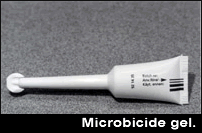Large
Trial Finds PRO 2000 Microbicide Is Ineffective in Preventing
HIV Infection in Women
 |
 |
 |
 |
 |
 |
 |
| SUMMARY:
The experimental vaginal microbicide gel
PRO
2000 -- which appeared promising in
earlier studies -- did not protect women
from becoming infected with HIV in a large
clinical trial known as MDP 301, which included
more than 9000 participants in Africa, investigators
announced on December 14. |
|
 |
 |
 |
 |
 |
 |
 |
By
Liz Highleyman
"The
largest international clinical trial to date into
a preventative HIV gel has found no evidence that
the vaginal
microbicide PRO 2000 reduces the risk of HIV infection
in women," according to a press release issued
by the U.K. Medical Research Council, one of the study
sponsors.
 PRO
2000 is a 0.5% microbicidal (germ-killing) gel applied
in the vagina prior to sexual intercourse. An earlier
study of more than 3000 African women (HPTN 035),
sponsored by the U.S. National Institutes of Health
(NIH) and presented at the Conference on Retroviruses
and Opportunistic Infections this past February, was
the first human clinical trial to suggest that a microbicide
might prevent male-to-female sexual transmission of
HIV. In that study, PRO
2000 demonstrated 30% effectiveness, falling just
short of the 33% threshold for statistical significance.
PRO
2000 is a 0.5% microbicidal (germ-killing) gel applied
in the vagina prior to sexual intercourse. An earlier
study of more than 3000 African women (HPTN 035),
sponsored by the U.S. National Institutes of Health
(NIH) and presented at the Conference on Retroviruses
and Opportunistic Infections this past February, was
the first human clinical trial to suggest that a microbicide
might prevent male-to-female sexual transmission of
HIV. In that study, PRO
2000 demonstrated 30% effectiveness, falling just
short of the 33% threshold for statistical significance.
The
MDP 301 trial was about 3 times larger than HTPN 035,
involving 9385 women at 6 research sites in 4 African
countries with high HIV prevalence rates. It was conduced
by the Microbicides Development Programme (MDP), a
not-for-profit partnership of 16 African and European
research institutions. Enrollment started in September
2005 and the trial ran through September 2009.
Participants
were randomly assigned to use PRO 2000 gel or a placebo
gel before each act of sexual intercourse. They also
received free condoms, which they were instructed
to use along with the gel. The women were followed
for 12 months at most study sites, or up to 24 months
in Uganda.
"[T]he
risk of HIV infection in women who were supplied with
PRO 2000 gel was not significantly different than
in women supplied with placebo gel," according
to the MRC statement. "To date, no microbicide
has been shown to be effective against HIV infection.
This trial shows conclusively that PRO 2000 gel is
of no added benefit, ending scientific speculation
about its clinical importance."
In
the PRO 2000 group, 130 new HIV infections occurred
among 3156 women, compared with 123 infections among
3112 women in the placebo group. This translates to
4.5 infections per 100 person-years in the PRO 2000
group versus 4.3 in the placebo group, not a statistically
significant difference. PRO 2000 gel was safe, however,
with no serious adverse side effects.
"This
result is disheartening," particularly in light
of the smaller NIH trial, said MDP 301 Chief Investigator
Sheena McCormack. "Nevertheless we know this
is an important result and it shows clearly the need
to undertake trials which are large enough to provide
definitive evidence for whether or not a product works."
"We all knew that the trend observed in HPTN
035 could have been due to chance," said Yasmin
Halima, Director of the Global Campaign for Microbicides
in a press release issued Monday. "While we are
deeply disappointed to learn definitively that PRO
2000 is not effective, it is our responsibility as
advocates to turn our full attention now to the candidates
currently in clinical trials."
"These
candidates, being tested as oral pills as well as
microbicides, contain antiretroviral drugs or ARVs,
the same life-saving medications used as treatment
by people living with HIV," she continued. "In
laboratory and animal studies, they appear to be many
times more potent than any of the non-ARV-based candidates."
Among
the ARVs, tenofovir
(Viread) and emtricitabine
(Emtriva) -- the 2 drugs in the Truvada
coformulation -- have undergone the most testing
as a method of pre-exposure prevention (PrEP), administered
as microbicides, injections, or pills.
"We
know that women and their partners liked the gels
and used them [in the MDP 301 trial]," said McCormack.
"Women reported that using it increased sexual
pleasure and fostered intimacy by helping women talk
about sex with their partners. So we know that we
have the method right. Now we just need a product
with the potency to stop HIV."
MDP
301 trial participants are currently being informed
of the trial findings. Complete results will be submitted
for presentation at international conferences in 2010,
as well as for publication in a peer-reviewed journal.
12/15/09
Source
U.K.
Medical Research Council. HIV 'prevention' gel PRO
2000 proven ineffective. Press release. December
14, 2009.
Global
Campaign for Microbicides. Microbicide trial results
signal end of one chapter, focus turns to promising
ARV-based candidates. Press release. December
14, 2009.